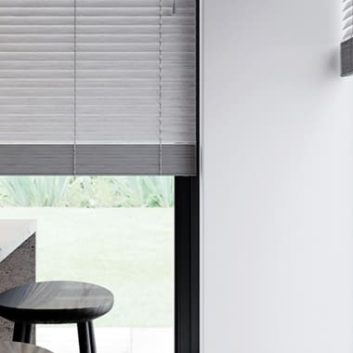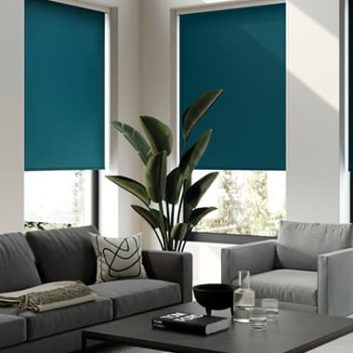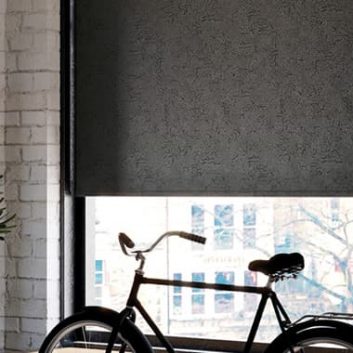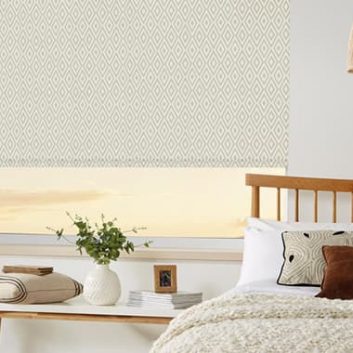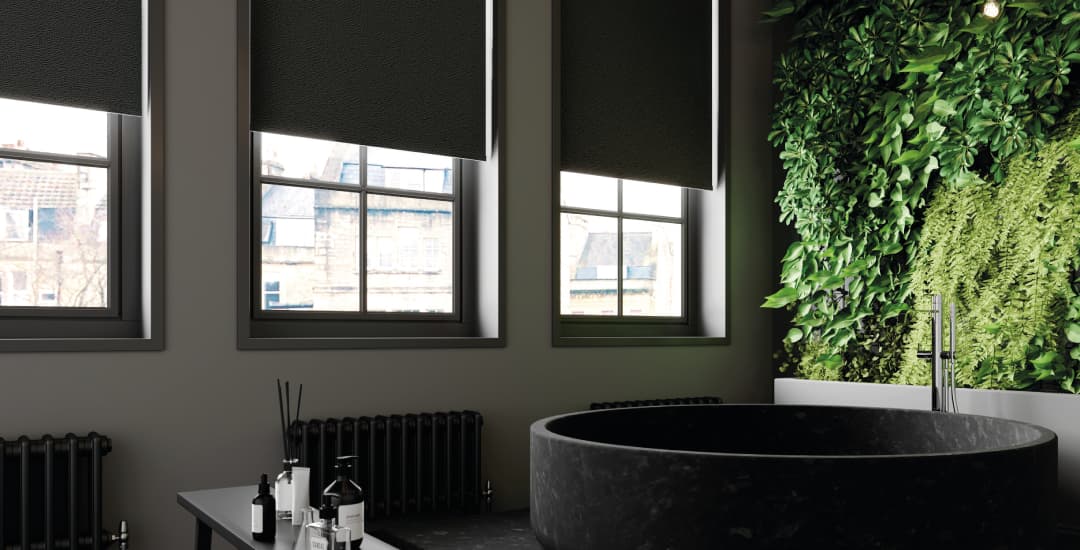
Do bathroom blinds need to be waterproof? Yes, if there’s any likelihood that they’re going to get wet, and/or the bathroom gets humid when in use. This accounts for the majority of bathrooms in the UK, and so we recommend choosing waterproof blinds for most bathrooms as the default.
There are some exceptions for certain bathroom environments (which I’ll cover shortly), but as a rule, choosing waterproof bathroom blinds is the safest option for most.
This blog post will tell you what waterproof blinds are made of, and how to determine what blinds are suitable for bathrooms of different types.
Do bathroom blinds need to be waterproof in every type of bathroom?
You’ll certainly want to pick waterproof blinds for the vast majority of bathroom layouts/sizes/scenarios, as non-waterproof blinds will absorb some of moisture hanging around in the air of the bathroom, which can cause a number of problems and greatly reduce the blind’s lifespan.
There are the odd exceptions for people who have a bathroom that doesn’t get overly steamy, and that has windows a reasonable distance from the sink/shower/bath; you can consider getting non-waterproof blinds if you do. Bathroom blinds need to be waterproof if the general environment of the bathroom becomes moist and humid when in use though, even if the blinds never come into direct contact with water.
If you choose a non-waterproof blind for even a well-ventilated bathroom, we recommend that you blot or dry off any moisture that does build up on it if the bathroom is in use for longer than usual or becomes steamier than usual, particularly if the blind is made of a soft or delicate fabric like cotton or silk.
What are waterproof blinds made of?
Waterproof roller blinds for bathrooms are the most popular choice among buyers overall, and these are made of waterproof PVC or vinyl fabrics respectively. The same is true for waterproof vertical blinds.
Waterproof faux-wood blinds (a type of Venetian blind) are made of robust, solid and hardwearing rigid PVC.
All three of these bathroom blinds are 100% waterproof, fire-retardant, and made of blackout materials.
Are PVC blinds good for bathrooms, and are vinyl blinds any better/different?
PVC bathroom blinds (which gives you the option of roller blinds, vertical blinds, and rigid PVC faux-wood blinds) are totally waterproof, fire retardant, and achieve a blackout effect.
These three traits pretty much cover everything you need from a bathroom blind, being:
The ability to withstand any level of humidity or direct contact with water, ease of cleaning, safety in case of a fire (in the bathroom? No, I can’t think of a scenario either, but just in case), and protecting your privacy from onlookers outside.
Vinyl bathroom blinds may come in the form of roller or vertical blinds, and they tick all of the exact same boxes as PVC roller or vertical blinds. Only the makeup of the fabric (and so, how it feels to the touch and to an extent, looks) differs ever so slightly, but most people would be hard-pressed to tell the difference by sight or touch at all.
Neither PVC nor vinyl is considered superior nor able to do something that the other material cannot, so which material you pick is simply down to your personal preference, or more likely, what design or colour you prefer when browsing, with the material it is made from (as long as it’s a waterproof option) being more or less irrelevant for most buyers!
Are polyester blinds suitable for bathrooms?
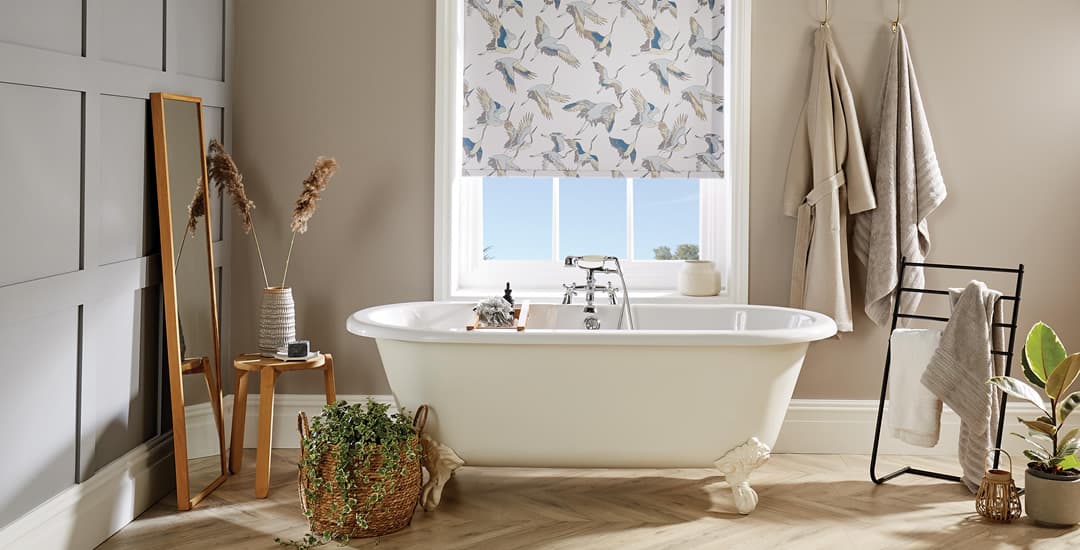
Polyester is a fabric option offered for roller blinds, vertical blinds, day and night blinds, and many types of Roman blinds.
But are polyester blinds suitable for bathrooms? Generally no, as polyester isn’t waterproof. The same exception I mentioned earlier in the “do bathroom blinds need to be waterproof in every type of bathroom” apply (or may apply) though for large, well-ventilated bathrooms that don’t see a lot of humidity, nor risk of the blind getting splashed.
Also, it is worth mentioning for the sake of being thorough that some polyester roller blind fabrics are treated with a moisture-resistant coating. However, this still doesn’t mean that you can get them wet regularly without consequence, but more that they’ll live for a reasonable lifespan in bathrooms that see a moderate level of humidity when in use.
Think of it like the difference between buying a showerproof jacket and a waterproof one; the former would likely keep you more or less dry during a ten-minute bout of light rain, but if you wore it for a day’s hike in typical British autumn or winter weather, you’d probably find yourself regretting your decision in short order!
Water-resistant or moisture-resistant polyester roller blinds aren’t widely offered for sale as there’s not really any demand for them, given that PVC and vinyl roller blinds are fully waterproof, generally fall around the same price point as an equivalen polyester blind, and are readily available to buy.
All told then for the majority of bathrooms, polyester blinds (even moisture-resistant ones, should you be able to find any) aren’t a great idea.
Where can you buy waterproof blinds for bathrooms?
Waterproof blinds for bathrooms are fairly ubiquitous to any range of blinds for sale, from more or less any online retailer or high street store. They range from cheap (and honestly, flimsy) readymade cut-to-size-yourself options that will probably last you a year or two in good order, to quality, made-to-measure bathroom blinds that will likely cost more than a readymade blind, but last for 10-20 years without incident.
Also, before you assume that you won’t be able to afford a made-to-measure bathroom blind or that it’s likely to cost you many times the price of a readymade one, run the numbers on one of our product pages.
As I explained in this blog post, there’s often not a lot in it, and made-to-measure blinds invariably cost less in the medium to long term due to their greatly increased lifespan.
What blinds are suitable for bathrooms in terms of blind types?
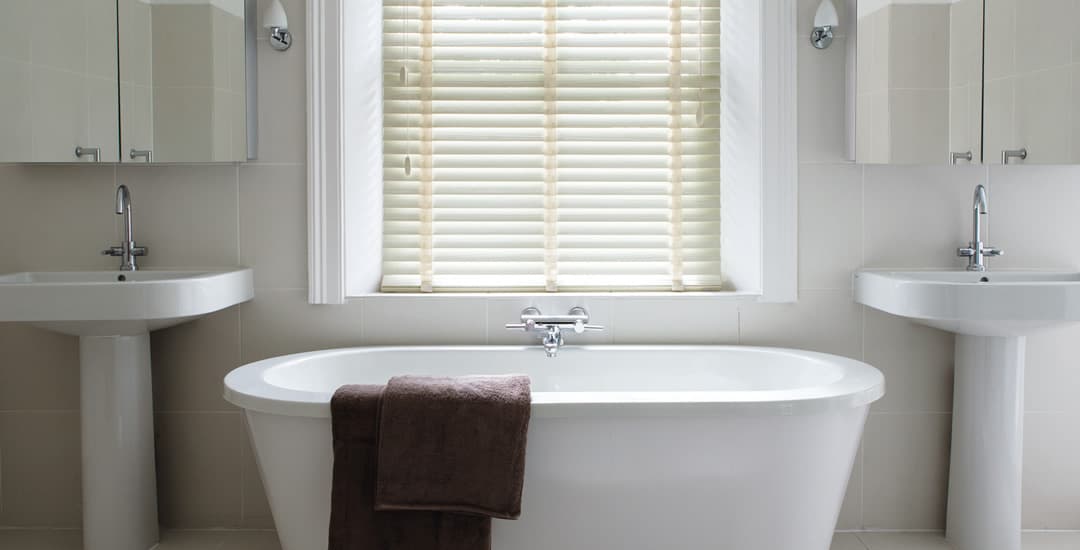
To summarise then, in terms of blind types rather than materials, what blinds are suitable for bathrooms? PVC or vinyl roller blinds or vertical blinds, or PVC faux-wood blinds are a 100% safe choice for all bathrooms.
If your bathroom is a reasonable size and particularly well ventilated (to the point that it doesn’t really steam up when in use) and there’s no danger of the blind coming into direct contact with water, you can consider other types of blinds and so, non-waterproof materials as well.
These might include non-waterproof roller or vertical blinds, and also Roman blinds, day and night blinds, and real wood or Venetian blinds made from materials as diverse as polyester, natural wood, aluminium, cottons, silks, and other fine fabrics.
However, we do urge you to proceed with extreme caution if you’re considering heading in this direction, as if you’re wrong about the humidity levels your blinds will be subjected to, this can affect both their appearance and functionality within just a couple of years, or possibly even less.
Can you put blinds in a shower?
Can you put blinds in a shower? I get that this question might well be causing a lot of you to go “huh!?” But I’m giving it a short shout out anyway, as at one point I personally had a small wet room with the window open to and within a couple of feet of the shower fitting itself.
In this sort of situation, you would most definitely need fully waterproof bathroom blinds to cover a window in a shower, and this is what I had over my tiny shower window for some five years.
I had the blind hung outside of the recess (so water didn’t pool on the window sill under it), and the window was high enough up from the fixed shower head to ensure that it only ever came into peripheral contact with water.
This worked just fine; but bear in mind that this is not the same sort of effect you’d get if you aimed a directional shower head at the blind (deliberately or inadvertently) and the water pressure moved the blind about.
With this experience in mind, I’m going to suggest that having a blind over a window that is actually in a shower would probably only work if the blind was unlikely to get any more than a level of splashback from the shower… Rather than being subject to the direct impact of water under pressure from the showerhead.
I say this because pressurised water might well push any type of blind sufficiently to allow water to sheet down it and then off the bottom of it, or force water through the slats/louvres of faux-wood and vertical blinds respectively too.
It also occurs to me that based on the fact that “can you use blinds in a shower” is apparently a question that comes up on Google now and then, some people might be asking this in the context of wondering if you can use a blind as a shower screen or curtain rather than over a window in a shower.
In the interests of science, I spent a good hour of my employer’s time pondering on this very question and considering its implications in detail, as well as polling some of the design and fabrication workers, largely those that coincidentally happened to be in the break room at the time.
My conclusions then, other than that white chocolate KitKats are overrated, are:
A vertical blind (waterproof) would not work in a shower as a barrier, as if and when water from the shower hits it, it will shuffle the louvres and result in the area outside of the shower getting wet too.
A waterproof roller blind again would be apt to move when water hits it with any power. This would probably not result in as much mess as a power shower beating the crap out of vertical blind louvres, but would still tend to push the blind’s fabric outwards; to the point that it may lift the bottom of the blind from the shower tray and cause water to sheet off it outside of the shower tray’s confines.
A waterproof faux-wood blind then?
I’m going to say that this would be the lesser of the three evils, but it is also likely to suffer from the same sort of issues as the roller blind would, and also a powerful shower could/would probably force water out through the closed slats of the blind too.
Overall then, yes you can probably put (waterproof) blinds over a window in a shower if it’s likely to get splashed but not aimed at, but I do not think that you could use a waterproof blind in place of a shower curtain or screen.
As I’m sure you can imagine, I’m literally dying to hear from anyone who has used a blind of any kind as a shower partition/screen, so please I beg of you, share with the class, whether your experience deems my theoretical extrapolations to be wholly incorrect or No Lies Detected.
Thank you.

